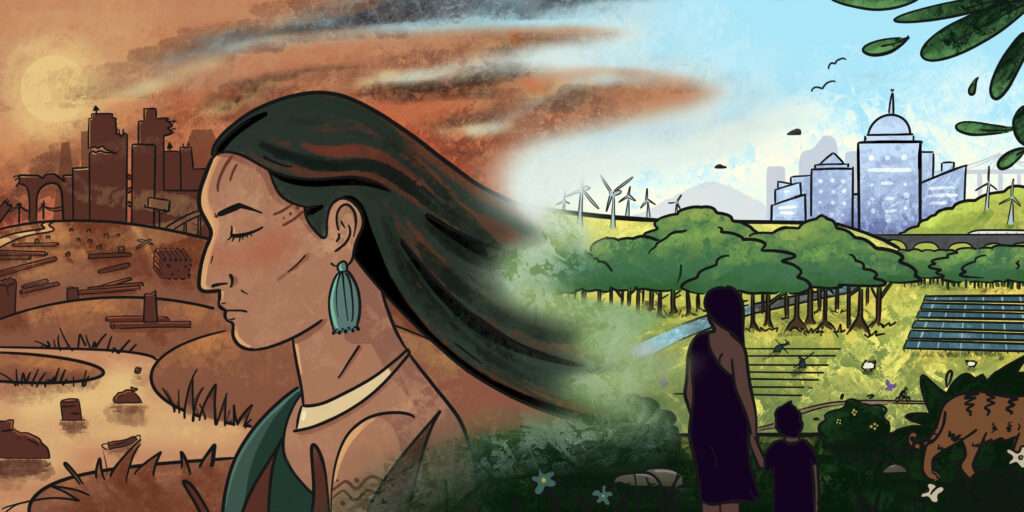We all know that climate change is a global crisis that affects everyone, but it does not affect everyone equally. Decolonising climate change is an important step toward sustainability (Whyte et al. 2017). Keeping in mind, the countries that contribute least to climate change are the ones that suffer the most from its consequences. Historically, marginalised communities, particularly those that have experienced colonialism and imperialism, bear a disproportionate burden of the environmental and social consequences of climate change compared to other communities. Consequently, climate change impacts are already shaping the lives, livelihoods, and human rights of over 370 million Indigenous Peoples worldwide.
Recently, there have been growing movements to decolonise the discourse around climate change, by acknowledging injustices while addressing environmental crises. Climate change is often understood as only an “environmental” issue, but many Indigenous leaders find that the root problem of climate change is colonialism. Hence, this article explores decolonising climate change in the fight against global warming, and key strategies for achieving environmental justice.
What do we mean by decolonising Climate Change?
In order to understand what decolonising climate change means, we need to understand how climate change is colonialised. Climate colonialism shows how “connecting climate change to … acts of colonisation involves recognising historic injustices”. Furthermore, colonialism, primarily driven by European powers, led to the exploitation of natural resources and the displacement of Indigenous communities. This exploitation created a global economic system that relies on fossil fuels and resource extraction, contributing significantly to GHG emissions. Furthermore, the legacy of colonialism shows how marginalised and dispossessed Indigenous peoples continue to influence climate change’s impact on vulnerable populations.

Source: Science for the People
The consequences of colonialism are glaringly evident in the environmental disparities faced by marginalised communities. As mentioned previously, Indigenous peoples and communities in the Global South often bear the brunt of climate change, despite contributing the least to its causes. They experience severe weather events, food insecurity, displacement, and loss of cultural heritage due to the encroaching effects of global warming. However, these communities are left with little power to mitigate or adapt to the changing climate, and their voices are often ignored in international climate negotiations.
Key aspects of decolonising climate change include:
Recognising historical injustices:
Decolonising climate change acknowledges that colonial and imperial powers have historically exploited and degraded the environments of colonised regions and displaced or marginalised Indigenous peoples. Often, this causes lasting harm to their ways of life and their ability to adapt to climate change. Hence, it is important to support them with financial and technological resources to adapt and mitigate climate change impacts.
Centering Indigenous knowledge:
Indigenous communities often possess valuable traditional knowledge and sustainable practices that can help mitigate and adapt to climate change. Decolonising climate change involves respecting and incorporating this knowledge into climate policies and actions.
Addressing Environmental Racism:
It emphasises the need to address environmental racism, which refers to the disproportionate burden of environmental pollution and climate impacts that marginalised communities, particularly communities of colour, often bear.
Environmental Justice:
Which means ensuring that all communities have equal access to resources and opportunities for a sustainable future. Moreover, ensuring that policies and actions to combat climate change do not disproportionately harm marginalised communities.
Redistributing Resources And Power:
To decolonise climate change, there is a call to shift power and resources away from historically dominant, often Western, nations and corporations towards affected communities. Furthermore, this includes reparations and support for developing countries in their efforts to mitigate and adapt to climate change.
Challenging The Dominant Narrative:
Decolonising climate change critiques the dominant narratives of climate action, which often prioritise market-based solutions and technology fixes. It calls for a broader and more inclusive perspective that addresses systemic inequalities. It also requires giving marginalised communities a seat at the table in climate negotiations and policy development. Their input and perspectives are crucial for shaping equitable and effective climate solutions.
Land Rights:
Land dispossession and deforestation have been major drivers of carbon emissions, making the restoration and protection of these lands crucial for climate mitigation. Therefore, recognizing and upholding the land rights of indigenous communities is essential.
Redefining Development:
Traditional notions of development often prioritise economic growth at the expense of the environment and marginalised communities. Decolonising climate change requires redefining development paradigms to prioritise sustainability, equity, and community well-being.
Challenging Power Structures:
Decolonising climate change necessitates challenging the power structures that perpetuate environmental injustices. This involves questioning and transforming systems of oppression, such as racism, (mono)-capitalism, and patriarchy, which often intersect with climate change impacts. Advocating for inclusive and equitable decision-making processes, supporting grassroots movements, and amplifying marginalised voices are essential steps in dismantling these power structures.
Climate Reparations And Redistribution:
Addressing climate change requires financial resources and a commitment to redistributive justice. Decolonising climate change means acknowledging the historical responsibility of colonial powers and supporting climate reparations for affected communities.
Why is it essential that we focus on decolonising climate change?
Decolonising climate change is essential for effectively combating the climate crisis. Recognising the interconnectednes of environmental issues, social justice, and historical injustices is critical for building a sustainable and equitable future. By putting marginalised communities at the forefront of climate action, we can develop effective strategies and policies to address the root causes of climate change.
Furthermore, the global nature of climate change means that solutions must be inclusive and collaborative. The impacts of climate change do not respect borders, and international cooperation is paramount. Decolonising climate change fosters a sense of shared responsibility and encourages all nations to work together for a more sustainable and just world.
achieving the United Nations Sustainable Development Goals (SDGs) and how they link to decolonising Climate Change
The United Nations Sustainable Development Goals (SDGs) represent a comprehensive framework for addressing global challenges by 2030. They encompass a wide range of interconnected issues, including poverty, inequality, education, climate change, environmental degradation, peace, and justice.
- Environmental Justice (SDG 13 – Climate Action): It means addressing the disproportionate impact of climate change on indigenous communities and developing nations. Achieving SDG 13 involves mitigation and adaptation strategies that prioritise the needs of these vulnerable groups.
- Reducing Inequality (SDG 10 – Reduced Inequalities): Decolonisation is about addressing power imbalances. Similarly, SDG 10 aims to reduce inequality within and among countries. By empowering marginalised communities and giving them a voice in climate action, it’s possible to decolonise climate initiatives.
- Partnerships and Collaborations (SDG 17 – Partnerships for the Goals): Collaboration is crucial in respecting diverse knowledge systems and involving indigenous communities in decision-making processes related to climate change.
- Respect for Indigenous Knowledge and Rights (SDG 4 – Quality Education, and SDG 16 – Peace, Justice, and Strong Institutions): SDG 4 emphasises inclusive and equitable quality education, promoting learning about diverse cultural perspectives on the environment. SDG 16 emphasises just and accountable institutions, crucial for protecting indigenous rights in the face of climate change.
- Sustainable Development (SDG 7 – Affordable and Clean Energy, SDG 11 – Sustainable Cities and Communities, SDG 12 – Responsible Consumption and Production): Achieving sustainable development involves transitioning to clean energy, building sustainable cities, and promoting responsible consumption. Decolonising climate change requires a transition from harmful practices to sustainable, regenerative methods that serve both humanity and the environment.
The connection between achieving the SDGs and decolonising climate change highlights recognising historical backgrounds and placing justice in our approach.
A Thrivable Framework
Decolonising climate change involves a holistic approach that tackles environmental degradation, historical injustices, and social inequalities. It emphasises a fairer response to climate change, integrating the knowledge of marginalised communities and challenging the existing norms in addressing climate issues. This approach is crucial in fighting global warming, particularly its unequal impacts. Rectifying historical injustices is key to developing more effective, fair, and sustainable solutions.
The UN affiliated research group, THRIVE Project, is an international pioneer of global sustainability, using a holistic model for thrivability. THRIVE shows a keen interest in social and political drivers that are essential for the well-being of our society. Thrivability is beyond mere sustainability, and includes a focus on evaluating challenges connected to the legal system and human rights. We at THRIVE Project believe that humanity can significantly improve its collective well-being by harnessing the knowledge currently available to us.
The vast information available offers a chance to tackle worldwide issues by promoting cooperation, innovation, and fair access to resources. Using this knowledge can help create a more inclusive, resilient, and sustainable world, encouraging a shared responsibility for the planet.
Further Resources about the THRIVE Project
The THRIVE Project advocates for a thrivable future for all. You can find further information about the project in our blog, YouTube channel, newsletter, podcast, or join our informative webinars.























